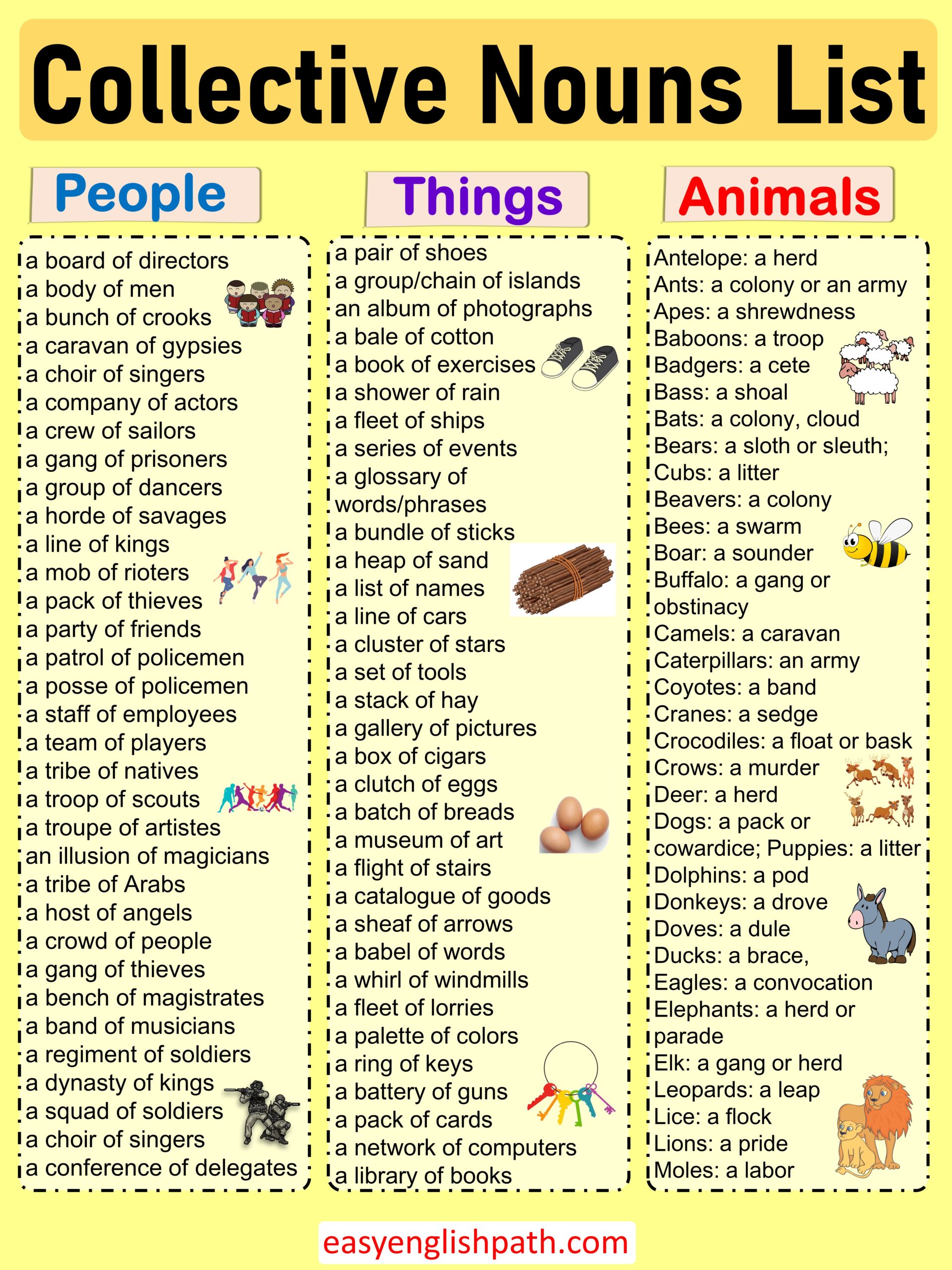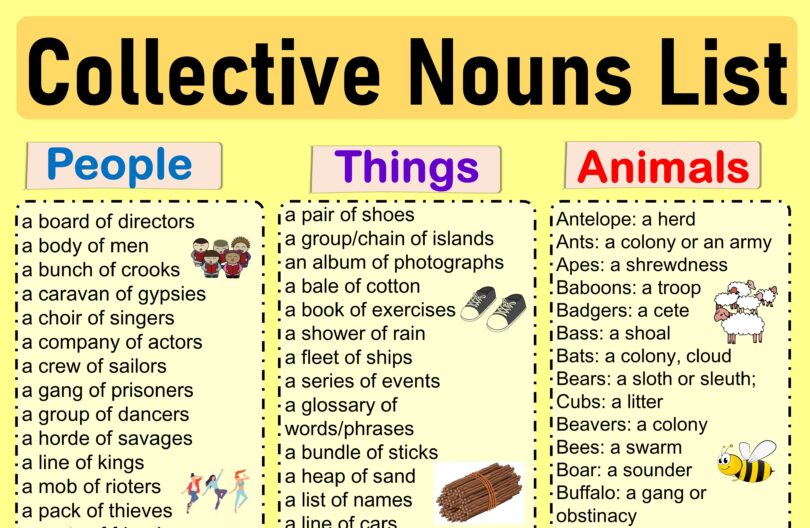Collective nouns are used to describe a collection of groups of people, animals, and objects. in this blog, we shall discuss collective nouns with examples that would help you learn how to use them in writing.

What is a Collective Noun?
A collective noun is a word that refers to a group of individuals or things considered as a single unit. These nouns describe collections of people, animals, objects, or concepts.
Examples of Collective Nouns:
| Collective Noun | Explanation |
|---|---|
| Team | Instead of saying “a bunch of players,” we say “a team of players.” |
| Herd | Rather than listing each cow, we say “a herd of cattle.” |
| Flock | Instead of naming every bird, we use “a flock of birds.” |
| Family | Instead of specifying each family member, we say “a family of four.” |
| Swarm | Rather than counting each bee, we use “a swarm of bees.” |
Difference Between Collective Nouns and Plural Nouns
| Feature | Collective Nouns | Plural Nouns |
|---|---|---|
| Definition | A singular noun that represents a group of people, animals, or things. | A noun that refers to more than one person, animal, or thing. |
| Singular or Plural? | Usually singular but can be plural depending on context. | Always plural. |
| Verb Agreement | Can take singular or plural verbs depending on whether the group acts as one unit or as individuals. | Always takes a plural verb. |
| Examples | Team, family, herd, flock, crowd, committee | Dogs, chairs, apples, cars, books |
| Sentence Example | The team is playing well. (one unit) | The players are warming up. (multiple individuals) |
Are Collective Nouns Singular or Plural?
Collective nouns can be singular or plural depending on how we think about the group.
✅ Singular Usage: When referring to the group as one whole unit.
The team is winning the game.
The flock is flying in the sky.
The class is learning new things.
✅ Plural Usage: When referring to the individuals within the group separately.
The team are wearing their jerseys.
The flock are chirping loudly.
The class are discussing their ideas.
How to Use Collective Nouns?
1. Identify the Group as a Whole
Use the singular form when the group is acting as one unit.
The herd is migrating south for the winter.
The team is celebrating its victory.
2. Emphasize Individual Members
Use the plural form when focusing on the individuals in the group.
The team are working hard on their respective projects.
The family are preparing their own dishes for the potluck dinner.
3. Match Verb Agreement
Choose the correct verb form based on whether the group acts as one unit or individuals.
✅ The choir is practicing for the concert.
✅ The choir members are practicing for the concert.
4. Consider Context
Think about whether you are talking about the whole group or its members.
✅ The staff is attending a training session together.
✅ The staff are bringing their unique skills to the project.
5. Use Intuition
If the collective noun feels like one unit, use the singular form. If it feels more like individuals, use the plural form.
✅ The family is going on a vacation.
✅ The family are packing their bags for the trip.
Examples of Collective Nouns
| Collective Noun | Example Sentence |
| A herd of cattle | The herd is grazing in the field. |
| A pack of wolves | A pack of wolves is hunting together. |
| A flock of birds | The flock is flying towards the south. |
| A school of fish | A school of fish swims in the ocean. |
| A colony of ants | The colony is building its nest. |
Categories of Collective Nouns
- Collective Nouns For People
- Collective Nouns For Animals
- Collective Nouns for Things
Collective Nouns For People
- A team of players
- A class of students
- A crew of sailors
- An audience of spectators
- A family of four
- A staff of employees
- A band of musicians
- A group of friends
- An assembly of people
- A crowd of onlookers
- A cast of actors
- A panel of experts
- A committee of members
- A choir of singers
- A tribe of indigenous people
- A party of friends
- A team of colleagues
- A squad of athletes
- A congregation of worshippers
- An ensemble of performers
Collective Nouns For Animals
- A herd of cattle
- A pack of wolves
- A pride of lions
- A pod of dolphins
- A flock of birds
- A swarm of bees
- A school of fish
- A colony of ants
- A troop of monkeys
- A murder of crows
- A gaggle of geese
- A herd of elephants
- A pride of tigers
- A pod of whales
- A covey of quail
- A colony of penguins
- A shoal of fish
- A pack of dogs
- A clowder of cats
- A parliament of owls
Collective Nouns For Things
- A stack of books
- A collection of coins
- A bouquet of flowers
- A fleet of ships
- A bunch of keys
- A cluster of stars
- An assortment of chocolates
- A set of tools
- A library of books
- A row of houses
- A heap of clothes
- A bundle of sticks
- A suite of furniture
- A range of mountains
- A pile of papers
- A batch of cookies
- A gallery of art
- A fleet of cars
- A network of computers
- A chest of drawers
FAQs About Collective Nouns
1. What is a collective noun?
A collective noun is a word that represents a group of people, animals, or things considered as one unit. Examples include team, flock, and herd.
2. Can collective nouns be both singular and plural?
Yes. If the group acts as a single unit, use singular (The team is playing). If focusing on individuals, use plural (The team are wearing their uniforms).
3. Is “family” a collective noun?
Yes, “family” is a collective noun. You can say, “The family is going on vacation” (one unit) or “The family are packing their bags” (individual members).
4. What is the difference between “herd” and “flock”?
A “herd” refers to large land animals like cattle, while a “flock” is used for birds or smaller animals like sheep.
5. Can I use “group” for both people and things?
Yes! “Group” is a flexible collective noun. You can say “A group of friends” or “A group of islands.”
You May Also Like





